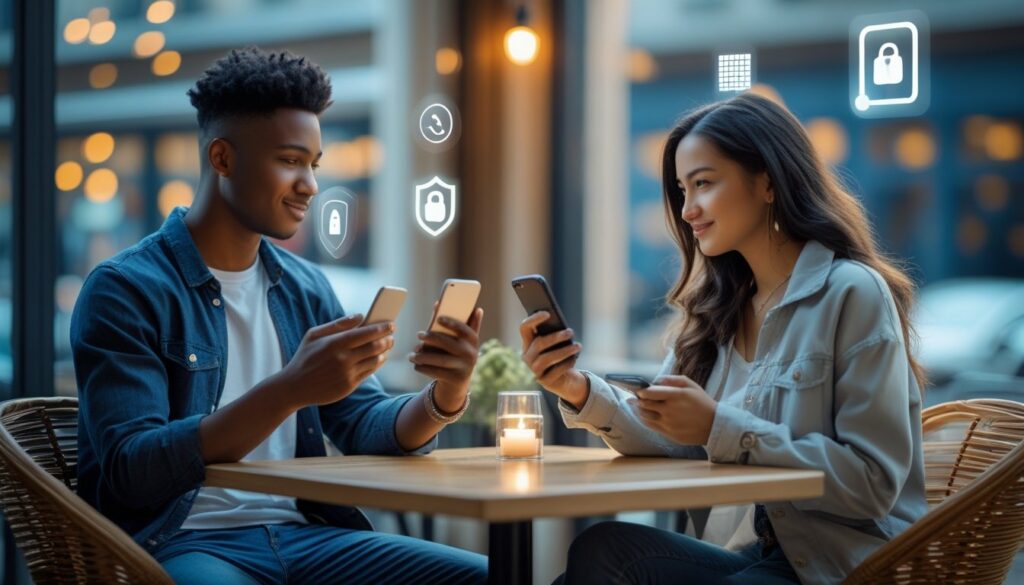Social media has changed how we connect with others. People now share personal details faster than ever before.
Dating today means dealing with too much information too soon, which can hurt your chances of building a real connection.

You might get a text about someone’s childhood trauma on the second date. Or you might find yourself telling a near-stranger about your deepest fears over dinner.
This happens more often than you think. When you share too much too fast, you can push people away or create fake closeness.
Learning the right balance takes practice. You need to know when to open up and when to hold back.
Key Takeaways
- Sharing too much personal information too quickly can damage new relationships
- Toxic dating behaviors like emotional flooding are becoming more common
- Setting healthy boundaries around what you share helps build stronger connections
What Is Dating in the Age of Oversharing?

Dating today means you navigate a world where people share personal details online before meeting in person. This shift has changed how you build trust and form connections with potential partners.
Defining Oversharing and Emotional Intimacy
Oversharing happens when you reveal too much personal information too quickly in a relationship. You might share deep traumas, financial problems, or family secrets on a first date.
Traditional emotional intimacy builds slowly over time. You start with basic facts about yourself and then gradually share deeper feelings as trust grows.
In contrast, oversharing skips these natural stages. You might tell someone about your divorce, mental health struggles, or childhood issues within hours of meeting.
Relationship experts point out key differences:
- Healthy sharing: You reveal information at an appropriate pace
- Oversharing: You dump emotional content without considering timing
- Emotional intimacy: You grow closer through mutual vulnerability and trust
This creates confusion about what counts as genuine connection. When someone shares their deepest secrets immediately, it can feel like instant closeness.
But real emotional intimacy requires time to develop.
Rise of Digital Vulnerability
Social media encourages personal sharing in dating. Your Instagram stories, Facebook posts, and dating profiles already reveal details about your life before you even meet.
Dating apps ask you to share photos, personal interests, and relationship goals upfront. This creates a false sense of knowing someone before your first conversation.
The dating trend of “trauma dumping” has become common on apps like Tinder and Bumble. People share serious personal struggles in their bio or opening messages.
Digital platforms that promote oversharing include:
- Instagram Stories with personal updates
- TikTok videos about relationship problems
- Twitter threads about dating experiences
- Snapchat with constant life updates
This constant sharing makes vulnerability feel normal and expected. You might feel pressure to match someone’s openness immediately.
Many people now confuse sharing information with building an actual connection.
Impacts on Modern Relationships
Oversharing creates several problems in modern dating. It can overwhelm potential partners who aren’t ready for deep emotional content.
Relationship experts warn that too much sharing too fast can prevent real bonding. When you know everything about someone immediately, there’s less mystery and discovery.
Common relationship impacts include:
- Faster burnout: Relationships feel intense but don’t last
- Boundary confusion: Partners struggle to set healthy limits
- Emotional exhaustion: Constant heavy conversations drain energy
- Trust issues: Oversharing can feel manipulative or attention-seeking
Some people use oversharing as a defense mechanism. By controlling the narrative about their problems, they avoid dealing with them directly.
Some couples find that early vulnerability helps them connect more authentically. The key is finding balance between openness and appropriate boundaries.
Floodlighting: The New Toxic Dating Trend

This new dating behavior involves oversharing deeply personal information too early in relationships. People dump their entire emotional history on dates and create uncomfortable situations that push potential partners away.
What Is Floodlighting in Dating?
Floodlighting happens when someone shares way too much personal information during early dates. You might meet someone who tells you about their childhood trauma, past relationships, or mental health struggles within the first few conversations.
This isn’t just being open. It’s dumping heavy emotional content on someone you barely know.
Common floodlighting behaviors include:
- Sharing detailed stories about ex-partners on the first date
- Discussing family problems or childhood trauma early on
- Revealing financial struggles or legal issues right away
- Talking about mental health diagnoses before building trust
Relationship experts say social media culture has grown this toxic dating trend. People think sharing everything quickly creates instant connection.
But floodlighting actually does the opposite. It overwhelms the other person and makes them uncomfortable.
Floodlighting vs. Healthy Vulnerability
There’s a big difference between being vulnerable and floodlighting. Healthy vulnerability builds slowly over time as trust develops.
Healthy vulnerability looks like:
- Sharing feelings about current situations
- Being honest about your values and goals
Floodlighting looks like:
- Dumping your entire life story immediately
- Using dates as therapy sessions
The key difference is timing and consideration. Healthy vulnerability respects boundaries and develops naturally.
Why People Floodlight Early On
Many people floodlight because they want to find someone who accepts them completely. They think sharing everything upfront will help them find their perfect match faster.
Social media plays a big role too. We’re used to sharing personal details online with strangers. This makes oversharing feel normal in dating.
Other reasons people floodlight:
- Fear of wasting time on incompatible partners
- Wanting to avoid rejection later
- Mistaking intensity for intimacy
- Lack of understanding about healthy boundaries
Some people also floodlight because they’re not ready to date. They might use dating apps as a way to process emotions or find validation.
Floodlighting usually backfires. Instead of finding acceptance, it pushes people away and prevents real connections from forming.
Emotional Oversharing and Related Behaviors

Dating apps make sharing so easy that many people cross the line from openness into oversharing. This trend includes dumping heavy emotions too early, using trauma as conversation starters, and overwhelming matches with intense feelings.
Emotional Oversharing Explained
Emotional oversharing happens when you share deeply personal feelings or experiences too soon in a relationship. You might tell someone about your childhood trauma on the first date.
Or you could send long texts about your mental health struggles to someone you just matched with. This behavior often comes from wanting to connect quickly.
You might think sharing your deepest thoughts will create instant intimacy. But it usually does the opposite.
Signs you’re emotionally oversharing:
- Talking about past relationships in detail during early dates
- Sharing family problems or mental health issues right away
The problem is timing. These conversations have their place, but not in the first few interactions.
You need to build trust slowly.
Trauma Dumping: A Cautionary Tale
Trauma dumping is a specific type of emotional oversharing. It happens when you share traumatic experiences without considering if the other person wants to hear them.
You might think you’re being honest and open. But you’re actually putting emotional weight on someone who didn’t ask for it.
This often happens on dating apps. You might match with someone and immediately tell them about your difficult divorce.
Or you could share details about abuse, death, or other heavy topics in your first conversation.
Why trauma dumping hurts your dating life:
- It makes potential partners feel overwhelmed
- You become the “therapist” instead of a romantic interest
Instead, save these conversations for when you know each other better. Let relationships develop naturally before sharing your deepest wounds.
Love Bombing and Other Problematic Patterns
Love bombing is another toxic dating trend that involves emotional overwhelm. This happens when someone showers you with excessive attention, gifts, and declarations of love very early on.
They might text you constantly or call you their soulmate after one date. Unlike oversharing your problems, love bombing overwhelms someone with positive emotions.
But it’s still problematic because it’s not genuine.
Red flags of love bombing:
- “I love you” within the first week
- Constant texting and calling
These behaviors often hide controlling tendencies. Someone who love bombs you might later become possessive or manipulative.
They’re trying to hook you emotionally before you can see their true personality.
Healthy relationships develop gradually. Real emotional connection takes time to build.
Navigating Emotional Pacing in New Relationships

When you start dating someone new, the speed at which you share feelings matters. Moving too fast emotionally can create pressure.
Taking time to build trust naturally leads to stronger connections.
The Importance of Emotional Pacing
Emotional pacing means sharing your feelings at a steady, comfortable rate. Think of it like learning to drive—you wouldn’t hit the gas pedal right away.
When you rush into deep emotional territory on the first few dates, you risk overwhelming your partner. This includes sharing traumatic experiences, talking about marriage, or saying “I love you” within weeks.
Healthy emotional pacing looks like:
- Sharing light personal stories first
- Gradually opening up about deeper topics
Your brain needs time to process new emotional information about someone. When you move too quickly, you miss important red flags or compatibility issues.
Building Trust Gradually
Trust forms the foundation of any lasting relationship. You can’t force it to happen overnight.
Start by sharing small, non-threatening details about yourself. Talk about your hobbies or favorite foods.
Watch how your partner responds to these lighter topics. Trust-building steps include:
- Keeping small promises consistently
- Listening without trying to fix everything
Pay attention to how your partner handles the information you share. Do they remember details? Do they ask thoughtful questions?
As weeks pass, you can gradually share more personal experiences. This might include past relationship challenges or family dynamics.
The key is matching each other’s pace. If your partner shares something personal, you can respond with something similar.
Avoiding the Emotional Caretaker Role
An emotional caretaker takes on responsibility for their partner’s feelings too early in dating. This creates an unbalanced dynamic.
When someone shares heavy emotional content right away, you might feel pressured to comfort them. This isn’t your job in a new relationship.
Signs you’re becoming an emotional caretaker:
- Constantly reassuring them about their worth
- Dropping your plans to handle their crises
You can be supportive without taking on this role. Listen when they share, but don’t try to solve all their problems.
Set clear boundaries about what you’re comfortable discussing. It’s okay to say, “That sounds really difficult, but I think a therapist would be better equipped to help you work through that.”
Healthy relationships involve two people who can manage their own emotions while supporting each other appropriately.
Risks and Consequences of Oversharing on Dates

If you share too much personal information too soon, you may face sudden rejection or create unhealthy relationship patterns. Oversharing can also destroy potential connections before they start.
Ghosting and Emotional Withdrawal
When you share deeply personal stories on early dates, your date might feel overwhelmed. They might suddenly stop responding to your texts or calls.
This happens because:
- Your date feels pressure to match your emotional intensity.
- They worry about becoming your therapist instead of your partner.
- The information feels too heavy for this early stage.
You might notice warning signs like shorter responses or delayed replies. Your date might also change the subject quickly when you bring up personal topics.
Some people ghost because they don’t know how to handle serious information. They feel trapped between being supportive and protecting their own emotional space.
Imbalances in Relationship Roles
Oversharing can create an uneven dynamic where you do all the talking and your date just listens. Your date might feel like they’re in a counseling session.
They may start seeing you as someone who needs fixing rather than an equal partner.
Common signs of this imbalance include:
- Your date asking fewer questions about themselves.
- Conversations always returning to your problems.
- Your date offering advice instead of sharing experiences.
The emotional connection becomes one-sided. You might feel closer, but your date could feel drained or responsible for your wellbeing.
Your date might also worry about sharing their own struggles. They may think their problems seem small compared to yours.
Damaged Trust and Missed Connections
If you share private information too quickly, you can actually harm trust instead of building it. Your date might question your judgment about boundaries.
They might wonder: If you tell me these secrets now, what will you tell others about me later?
Trust breaks down when:
- You share information that feels too intimate for your relationship stage.
- Your stories make your date uncomfortable.
- You ignore their social cues to slow down.
You might miss connections with people who could have been great matches. They judge you based on poor timing instead of getting to know you.
Your date might also feel manipulated, as if you’re trying to create false intimacy. Oversharing can seem like a strategy rather than genuine openness.
Real emotional connection grows slowly through mutual sharing and respect for boundaries.
Expert Advice: Healthy Sharing and Setting Boundaries

Finding the right balance between sharing and privacy helps you build stronger connections. The key is to pace emotional intimacy while protecting your personal space.
How to Build Genuine Emotional Connection
Building real emotional intimacy takes time and careful pacing. You can’t rush this process by sharing all your personal details at once.
Start small when you’re getting to know someone. Share basic preferences and light experiences first.
Notice how your date responds before moving to deeper topics. Match their level of sharing and pay attention to their comfort.
Give them time to process what you’ve shared. Ask questions about their experiences too.
Real connection happens through back-and-forth conversations. When you share something personal, watch for signs they’re engaged.
Do they ask follow-up questions? Do they share something similar back?
Avoid trauma dumping on early dates. Save heavy topics like past relationships or family problems for later.
This protects both of you from emotional overload.
Establishing Personal Boundaries
Setting boundaries protects your mental health and creates respect in your relationships. You need clear limits about what you will and won’t share.
Think about your comfort zones before dating. What topics feel too private right now?
What information do you want to keep to yourself?
Create boundaries around:
- Past relationship details
- Financial information
- Family conflicts
- Work problems
- Personal struggles
It’s okay to say, “I’m not ready to talk about that yet.” Good partners will respect your limits.
They won’t push you to share more than you’re comfortable with.
Boundaries can change over time. What feels too personal today might be fine to share in a few months.
Learning from Relationship Experts
Relationship experts say that healthy sharing builds trust over time. Dr. John Gottman found that couples who share appropriately form stronger bonds.
The best approach is “emotional bidding.” You make small attempts to connect and watch how your partner responds.
You might share a funny story. You could also mention something that bothered you.
Experts recommend this timeline:
- First few dates: Basic interests and light stories
- First month: Values and goals
- After three months: Deeper emotional experiences
- Six months plus: Past traumas and serious topics
Professional counselors warn people not to overshare too early. Sharing too much can create false intimacy.
Real emotional intimacy grows when both people feel safe and respected. Pay attention to how sharing affects your relationship.
Notice if sharing brings you closer or creates distance. Healthy sharing should feel natural and mutual.



